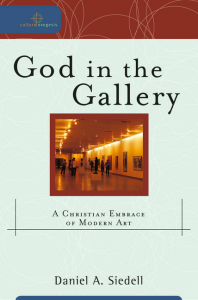 Last fall I had the chance to meet Dan Siedell, a fellow Lincoln native, when he made a trip back to Nebraska. (Dan teaches classes at both Knox Theological Seminary in Fort Lauderdale and at The King’s College in Manhattan.) We were able to have lunch as well as organize a brief discussion night at my church on issues related to Christianity and art. After our time together, I had several questions I wanted to ask Dan based on his comments at the event. So Dan and I stayed in touch and over the next few months did a long interview about the relationship between art, worldviews, and the life of local communities.
Last fall I had the chance to meet Dan Siedell, a fellow Lincoln native, when he made a trip back to Nebraska. (Dan teaches classes at both Knox Theological Seminary in Fort Lauderdale and at The King’s College in Manhattan.) We were able to have lunch as well as organize a brief discussion night at my church on issues related to Christianity and art. After our time together, I had several questions I wanted to ask Dan based on his comments at the event. So Dan and I stayed in touch and over the next few months did a long interview about the relationship between art, worldviews, and the life of local communities.
JM: In an interview in Curator, you said that if your first introduction to modern art had been with Hans Rookmaker, the Dutch critic who influenced Francis Schaeffer so deeply, you would have been forced to either give up your art or your faith. Why is that?
DS: I came to Rookmaaker, like I came to Schaeffer, after I’d already completed my course work for a Ph.D. in the history of modern art, after I’d moved to New York to study with a critic, moved again to pursue doctoral studies. When I was writing my dissertation, I’d already been married for three years, had our first child, and so I already had considerable skin—and bone—in the game. I’d sacrificed so much and knew that I would be called on to sacrifice a lot more to pursue my passion for modern art. [Rookmaker’s work] just rang hollow to me.
And I think it rang hollow for me because Rookmaaker’s and Schaeffer’s worldview focus was intellectual—it was about ideas and thoughts—and art was always just an expression of such things. For both [of them] there was a certain distance—art was kept at arm’s length, as it were. And that was not my experience. Now, I’ve had many people who studied with those two men tell me that they were passionate about it and encouraged their students to engage it. But their writing didn’t communicate that to me. I was converted to modern art through writing, through words, and so I’m very sensitive to my own voice and communicating a passion for my subject, a passion that encourages participation, not dismissal. Their work was also about a particular moment in which the “Christian artist” was a viable way to be faithfully present in culture. I don’t think that’s the case now.
Login to read more
Sign in or create a free account to access Subscriber-only content.
